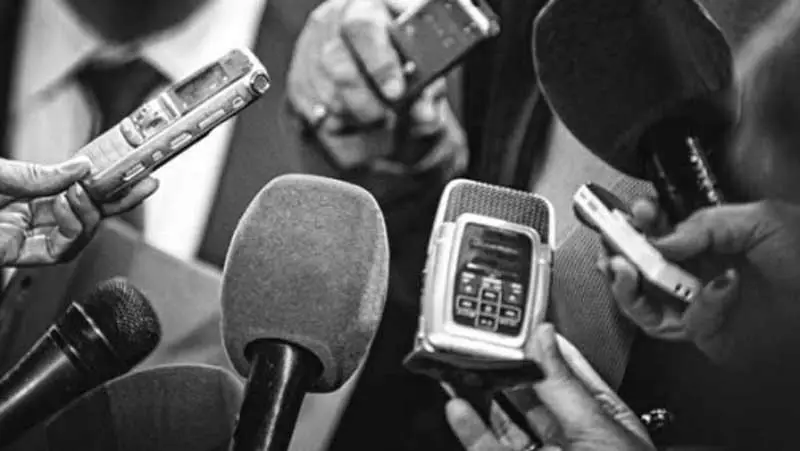Fact-checking has become a significant staple of the mass media. True journalism always did, but in certain instances when a prominent person makes a claim, professionals may flag it for what is essentially a lie-detection test.
Here are a few of such stories about Nigeria’s outgoing government. Only last month, for instance, President Muhammadu Buhari told Bloomberg News that he will be leaving Nigeria in better shape than he met it in 2015.
Of the economy, he affirmed: “We leave Nigeria in a far better place than we found it. Corruption is less hidden, for Nigerians feel empowered to report it without fear, while money is returned; terrorists no longer hold any territory in Nigeria, and their leaders are deceased; and vast infrastructure development sets the country on course for sustainable and equitable growth.”
- Daily Trust fact-checked this claim in partnership with the Centre for Democracy and Development. “Verdict: FALSE,” it reported, citing, among others:
- Nigeria’s inflation rate in 2015 was a single digit of 9.01 per cent…(rose) to 17.71% in May (2022), according to the recently released Consumer Price Index report, by the National Bureau of Statistics (NBS).
- Recent statistics from the Debt Management Office showed that Nigeria’s debt skyrocketed from N8.8 trillion in 2015 to N41 trillion as at June 2022…(and from N39.56 trillion in December 2021 to N41.60 trillion in the first three months of 2022 alone).
- In 2015 the dollar was exchanging at N198/$ in the parallel market…(and now exchanges) for between N600 to N610. Unemployment in the last quarter of 2015 stood at 10.4%, according to the National Bureau of Statistics…The latest figures from the NBS indicate that the unemployment rate now stands at 33.3 per cent.
The newspaper categorically rejected Buhari’s “better economy,” a pattern that has trailed his entire tenure.
In September 2015, for instance, he completed his first 100 days in office, the first marker that most people had for assessing his performance, given his promises for that three-month period. In a story in Africa Check on September 1, Eleanor Whitehead, the Economist’s West Africa correspondent, observed: “The president is yet to name a cabinet and has struggled to gain control of a rebellious national assembly. Jihadists continue to occupy some north-eastern territory and are staging bomb attacks on a weekly basis. Kids are still out of school and hospitals are a mess. Even on measures which he could have delivered alone – notably asset declaration – he has stalled.”
Similarly, at Buhari’s meeting in Abu Dhabi in January 2016 with the then-United Nations Secretary-General, Mr. Ban Ki Moon, President Buhari said that the Boko Haram insurgents had been driven to “fall-back” position, bragging: “They are currently not holding any territory today as we speak.”
Rebutting that claim in an extensive report on February 1, 2016, Premium Times said: “While Boko Haram appear to have been driven from most major population centres, there is evidence that they still hold territory and have operational bases in some remote rural areas such as the Sambisa Forest. There are also claims by displaced residents that the militants remain active in remote areas like Gwoza and Monguno.” It described his claim that the militants were “not holding any territory” at all as exaggerated, adding, “The conflict appears far from over.”
Prophetic words. Six years later, even the presidential palace has become so insecure that First Lady Aisha Buhari only visits it from Dubai.
In May 2017, to mark Buhari’s second anniversary, Africa Check investigated Buhari’s work. “In the run-up to the election,” it recalled, “Buhari promised Nigerians change through many policies, programmes and interventions, as contained in his Covenant with Nigerians document as well as the APC’s election manifesto.”
Focusing on nine promises he made about sectors that affected all Nigerians, it returned a dismal verdict of only one that had been fulfilled.
In London in 2018, Buhari reportedly bragged to Prime Minister Theresa May about his achievements in agriculture. “We have cut rice importation by about 90%, made lots of savings of foreign exchange, and generated employment. People had rushed to the cities to get oil money, at the expense of farming. But luckily, they are now going back to the farms. Even professionals are going back to the land. We are making steady progress on the road to food security.”
Citing data from Benin Republic and the International Grains Council, the International Center for Investigative Reporting (ICIR) denounced this claim as false. “Nigeria may have cut lawful rice importation by more than 90% but unlawful importation is still booming, which clearly means suggestions the country has equally made 90% progress on the path towards agricultural self-sufficiency are completely false!” it said.
Also in May 2018, ICIR fact-checked Buhari’s favourite sanctuary: the one about how poor oil prices have been during his tenure as opposed to what they were when the PDP was in charge. That month, he took it one step further in a speech to visiting members of the Buhari Support Organization as follows: ‘‘I challenge anybody to check from Europe, America and Asia; between 1999-2014, Nigeria was producing 2.1 million barrels of crude oil per day at an average cost of 100 USD per barrel and it went up to 143 USD. When we came, it collapsed to 37 – 38 USD and later was oscillating between 40 and 50 USD.”
In its carefully-researched rebuttal, ICIR declared: “The average price of crude oil per barrel from 1999 to 2015 was $61, not $100 as Buhari has repeatedly claimed since he became president.”
In 2019, Buhari announced an exciting thought: that he could lift 100 million people out of poverty in 10 years. Just two years later—abracadabra–he announced that he had lifted 10.5million out already.
He was promptly fact-checked by many, including AFP and Premium Times. “The data shows that Buhari’s claims about economic growth and poverty eradication in Nigeria are false,” said AFP.
“President Muhammadu Buhari’s claim of lifting 10.5 million people out of poverty is not supported by data,” said Premium Times. “It is grossly misleading.”
Also in 2019, Buhari declared Nigeria to have achieved “food security,” directing the Central Bank to provide no further foreign exchange for food importation.
He was fact-checked extensively, including by Dubawa, which concluded: With all the available facts and definitions on food security, Nigeria has not fulfilled any of the components that make a country food secure: food availability, access, utilization and stability. Hence, the claim that Nigeria has achieved food security is INCORRECT!”
As Buhari enters his final year, touring the world, Africa Check in June 2022 examined 20 of his electoral promises in 2015 and 2019 (in January 2019, he declared he had fulfilled all of his promises). The tally: three promises kept, AfricaCheck reported, and 16 broken!
Because Buhari listens to sycophants rather than the facts, he is probably staring at his iPad right now, trying to decide where the presidential jet heads next as must enjoy every drop of power he has left.
Hopefully, Nigerians, clear-eyed and stout-hearted, will not elect another person who—rather than earn credibility which stands the test of time—would rather manipulate the polygraph machine in their favour.
[This column welcomes rebuttals from interested government officials.]
- [email protected]
- @Sonala.Olumhense

 Join Daily Trust WhatsApp Community For Quick Access To News and Happenings Around You.
Join Daily Trust WhatsApp Community For Quick Access To News and Happenings Around You.


